Stirlingshire (UK Parliament constituency)
Stirlingshire was a Scottish county constituency of the House of Commons of the Parliament of Great Britain and later of the Parliament of the United Kingdom from 1708 until 1918. It elected one Member of Parliament (MP) by the first past the post voting system.
| Stirlingshire | |
|---|---|
| Former County constituency for the House of Commons | |
| Subdivisions of Scotland | Stirlingshire |
| 1708–1918 | |
| Number of members | One |
| Replaced by | Clackmannan & Eastern Stirlingshire Stirling & Clackmannan Western |
Creation
The British parliamentary constituency was created in 1708 following the Acts of Union, 1707 and replaced the former Parliament of Scotland shire constituency of Stirlingshire.
History
The constituency elected one Member of Parliament (MP) by the first past the post system until the seat was abolished in 1918. [1] [2] [3] [4] [5] For the 1918 general election it was divided into Clackmannan and Eastern Stirlingshire and Stirling and Clackmannan Western.
Members of Parliament
| Election | Member | Party | |
|---|---|---|---|
| 1708 | Henry Cunningham | ||
| 1710 | Sir Hugh Paterson | ||
| 1715 | Mungo Haldane | ||
| 1722 | John Graham | ||
| 1727 | Henry Cunningham | ||
| 1734 | Sir James Campbell | ||
| 1741 | Lord George Graham | ||
| 1747 | Lord Erskine | ||
| 1747 | James Campbell, later Livingstone | ||
| 1768 | Sir Thomas Dundas | ||
| 1794 | Robert Graham | ||
| 1796 | Sir George Elphinstone | ||
| 1802 | Charles Elphinstone Fleeming | ||
| 1812 | Sir Charles Edmonstone | ||
| 1821 | Henry Home-Drummond | Tory[6] | |
| 1831 | William Ramsay | Tory[6] | |
| 1832 | Charles Elphinstone Fleeming | Whig[6][7] | |
| 1835 | William Forbes | Conservative[6][7] | |
| 1838 | George Abercromby | Whig[6][7] | |
| 1841 | William Forbes | Conservative[6][7] | |
| 1855 | Peter Blackburn | Conservative[7] | |
| 1865 | John Erskine | Liberal[7] | |
| 1874 | Sir William Edmonstone | Conservative[7] | |
| 1880 | Joseph Cheney Bolton | Liberal[7] | |
| 1892 | William Jacks | Liberal | |
| 1895 | James McKillop | Conservative | |
| 1906 | Donald Mackenzie Smeaton | Liberal | |
| 1910 | William Chapple | Liberal | |
| 1918 | constituency abolished | ||
Elections
| Decades: |
Elections in the 1830s
| Party | Candidate | Votes | % | ||
|---|---|---|---|---|---|
| Tory | Henry Home-Drummond | Unopposed | |||
| Registered electors | 132 | ||||
| Tory hold | |||||
| Party | Candidate | Votes | % | ||
|---|---|---|---|---|---|
| Tory | William Ramsay | 45 | 54.9 | ||
| Whig | Charles Elphinstone Fleeming | 37 | 45.1 | ||
| Majority | 8 | 9.8 | |||
| Turnout | 82 | 62.1 | |||
| Registered electors | 132 | ||||
| Tory hold | |||||
| Party | Candidate | Votes | % | ±% | |
|---|---|---|---|---|---|
| Whig | Charles Elphinstone Fleeming | 995 | 68.2 | +23.1 | |
| Tory | William Forbes | 465 | 31.8 | −23.1 | |
| Majority | 530 | 36.4 | N/A | ||
| Turnout | 1,460 | 81.7 | +19.6 | ||
| Registered electors | 1,787 | ||||
| Whig gain from Tory | Swing | +23.1 | |||
| Party | Candidate | Votes | % | ±% | |
|---|---|---|---|---|---|
| Conservative | William Forbes | 779 | 50.7 | +18.9 | |
| Whig | Charles Elphinstone Fleeming | 759 | 49.3 | −18.9 | |
| Majority | 20 | 1.4 | N/A | ||
| Turnout | 1,538 | 79.0 | −2.7 | ||
| Registered electors | 1,948 | ||||
| Conservative gain from Whig | Swing | +18.9 | |||
| Party | Candidate | Votes | % | ±% | |
|---|---|---|---|---|---|
| Conservative | William Forbes | 859 | 50.0 | −0.7 | |
| Whig | George Abercromby | 858 | 50.0 | +0.7 | |
| Majority | 1 | 0.0 | −1.4 | ||
| Turnout | 1,717 | 81.6 | +2.6 | ||
| Registered electors | 2,105 | ||||
| Conservative hold | Swing | −0.7 | |||
- After scrutiny, Forbes' election was declared void and Abercromby was declared elected
Elections in the 1840s
| Party | Candidate | Votes | % | ±% | |
|---|---|---|---|---|---|
| Conservative | William Forbes | 1,019 | 53.2 | +3.2 | |
| Whig | Sir Michael Bruce, 7th Baronet | 895 | 46.8 | −3.2 | |
| Majority | 124 | 6.4 | +6.4 | ||
| Turnout | 1,914 | 82.4 | +0.8 | ||
| Registered electors | 2,323 | ||||
| Conservative hold | Swing | +3.2 | |||
| Party | Candidate | Votes | % | ±% | |
|---|---|---|---|---|---|
| Conservative | William Forbes | Unopposed | |||
| Registered electors | 2,398 | ||||
| Conservative hold | |||||
Elections in the 1850s
| Party | Candidate | Votes | % | ±% | |
|---|---|---|---|---|---|
| Conservative | William Forbes | Unopposed | |||
| Registered electors | 2,431 | ||||
| Conservative hold | |||||
Forbes' death caused a by-election.
| Party | Candidate | Votes | % | ±% | |
|---|---|---|---|---|---|
| Conservative | Peter Blackburn | Unopposed | |||
| Conservative hold | |||||
| Party | Candidate | Votes | % | ±% | |
|---|---|---|---|---|---|
| Conservative | Peter Blackburn | Unopposed | |||
| Registered electors | 1,973 | ||||
| Conservative hold | |||||
Blackburn was appointed a Lord Commissioner of the Treasury, requiring a by-election.
| Party | Candidate | Votes | % | ±% | |
|---|---|---|---|---|---|
| Conservative | Peter Blackburn | Unopposed | |||
| Conservative hold | |||||
| Party | Candidate | Votes | % | ±% | |
|---|---|---|---|---|---|
| Conservative | Peter Blackburn | Unopposed | |||
| Registered electors | 1,900 | ||||
| Conservative hold | |||||
Elections in the 1860s
| Party | Candidate | Votes | % | ±% | |
|---|---|---|---|---|---|
| Liberal | John Erskine | 726 | 51.2 | New | |
| Conservative | Peter Blackburn | 692 | 48.8 | N/A | |
| Majority | 34 | 2.4 | N/A | ||
| Turnout | 1,418 | 73.0 | N/A | ||
| Registered electors | 1,943 | ||||
| Liberal gain from Conservative | Swing | N/A | |||
| Party | Candidate | Votes | % | ±% | |
|---|---|---|---|---|---|
| Liberal | John Erskine | Unopposed | |||
| Registered electors | 2,751 | ||||
| Liberal hold | |||||
Elections in the 1870s
| Party | Candidate | Votes | % | ±% | |
|---|---|---|---|---|---|
| Conservative | William Edmonstone | 1,171 | 51.0 | New | |
| Liberal | Sir William Cunningham Bruce, 9th Baronet | 1,127 | 49.0 | N/A | |
| Majority | 44 | 2.0 | N/A | ||
| Turnout | 2,298 | 81.0 | N/A | ||
| Registered electors | 2,837 | ||||
| Conservative gain from Liberal | Swing | N/A | |||
Elections in the 1880s
| Party | Candidate | Votes | % | ±% | |
|---|---|---|---|---|---|
| Liberal | Joseph Cheney Bolton | 1,606 | 56.3 | +7.3 | |
| Conservative | William Edmonstone | 1,246 | 43.7 | −7.3 | |
| Majority | 360 | 12.6 | N/A | ||
| Turnout | 2,852 | 85.7 | +4.7 | ||
| Registered electors | 3,328 | ||||
| Liberal gain from Conservative | Swing | +7.3 | |||
| Party | Candidate | Votes | % | ±% | |
|---|---|---|---|---|---|
| Liberal | Joseph Cheney Bolton | 6,454 | 62.1 | +5.8 | |
| Conservative | Hugh Shaw-Stewart | 3,938 | 37.9 | −5.8 | |
| Majority | 2,516 | 24.2 | +11.6 | ||
| Turnout | 10,392 | 83.2 | −2.5 | ||
| Registered electors | 12,486 | ||||
| Liberal hold | Swing | +5.8 | |||
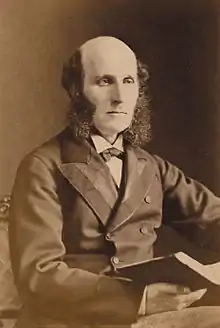
| Party | Candidate | Votes | % | ±% | |
|---|---|---|---|---|---|
| Liberal | Joseph Cheney Bolton | 5,067 | 53.7 | -8.4 | |
| Liberal Unionist | Ernest Noel | 4,360 | 46.3 | +8.4 | |
| Majority | 707 | 7.4 | -16.8 | ||
| Turnout | 9,427 | 75.5 | -7.7 | ||
| Registered electors | 12,486 | ||||
| Liberal hold | Swing | -8.4 | |||
Elections in the 1890s
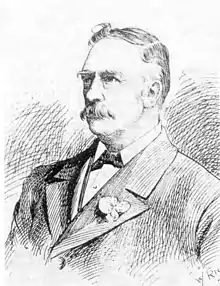
| Party | Candidate | Votes | % | ±% | |
|---|---|---|---|---|---|
| Liberal | William Jacks | 5,296 | 50.4 | -3.3 | |
| Liberal Unionist | Ernest Noel | 4,550 | 43.3 | -3.0 | |
| Scottish Trades Councils | Robert Chisholm Robertson | 663 | 6.3 | New | |
| Majority | 746 | 7.1 | -0.3 | ||
| Turnout | 10,509 | 80.1 | +4.6 | ||
| Registered electors | 13,128 | ||||
| Liberal hold | Swing | -0.2 | |||
| Party | Candidate | Votes | % | ±% | |
|---|---|---|---|---|---|
| Conservative | James McKillop | 5,916 | 51.9 | +8.6 | |
| Liberal | William Jacks | 5,489 | 48.1 | −2.3 | |
| Majority | 427 | 3.8 | N/A | ||
| Turnout | 11,405 | 79.6 | -0.5 | ||
| Registered electors | 14,329 | ||||
| Conservative gain from Liberal | Swing | +5.5 | |||
Elections in the 1900s
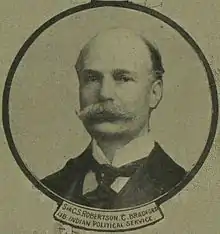
| Party | Candidate | Votes | % | ±% | |
|---|---|---|---|---|---|
| Conservative | James McKillop | 6,325 | 51.2 | -0.7 | |
| Liberal | George Scott Robertson | 6,023 | 48.8 | +0.7 | |
| Majority | 302 | 2.4 | -1.4 | ||
| Turnout | 12,348 | 76.3 | -3.3 | ||
| Registered electors | 16,179 | ||||
| Conservative hold | Swing | -0.7 | |||
| Party | Candidate | Votes | % | ±% | |
|---|---|---|---|---|---|
| Liberal | Donald Mackenzie Smeaton | 9,475 | 62.0 | +13.2 | |
| Conservative | James Graham | 5,806 | 38.0 | -13.2 | |
| Majority | 3,669 | 24.0 | N/A | ||
| Turnout | 15,281 | 80.7 | +4.4 | ||
| Registered electors | 18,942 | ||||
| Liberal gain from Conservative | Swing | +13.2 | |||
Elections in the 1910s
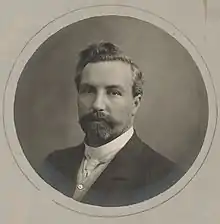
| Party | Candidate | Votes | % | ±% | |
|---|---|---|---|---|---|
| Liberal | William Chapple | 10,122 | 61.2 | -0.8 | |
| Conservative | Robert Horne | 6,417 | 38.8 | +0.8 | |
| Majority | 3,705 | 22.4 | -1.6 | ||
| Turnout | 16,539 | 82.1 | +1.4 | ||
| Registered electors | 20,144 | ||||
| Liberal hold | Swing | -0.8 | |||
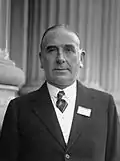
| Party | Candidate | Votes | % | ±% | |
|---|---|---|---|---|---|
| Liberal | William Chapple | 9,183 | 58.6 | -2.6 | |
| Conservative | Robert Horne | 6,487 | 41.4 | +2.6 | |
| Majority | 2,696 | 17.2 | -5.2 | ||
| Turnout | 15,670 | 77.2 | -4.9 | ||
| Registered electors | 20,294 | ||||
| Liberal hold | Swing | -2.6 | |||
General Election 1914/15:
Another General Election was required to take place before the end of 1915. The political parties had been making preparations for an election to take place and by the July 1914, the following candidates had been selected;
- Liberal: William Chapple
- Unionist: Andrew B. King[16]
References
- "Stirlingshire". History of Parliament Online (1690-1715). Retrieved 9 June 2019.
- "Stirlingshire". History of Parliament Online (1715-1754). Retrieved 9 June 2019.
- "Stirlingshire". History of Parliament Online (1754-1790). Retrieved 9 June 2019.
- "Stirlingshire". History of Parliament Online (1790-1820). Retrieved 9 June 2019.
- "Stirlingshire". History of Parliament Online (1820-1832). Retrieved 9 June 2019.
- Smith, Henry Stooks (1842). The Register of Parliamentary Contested Elections (Second ed.). Simpkin, Marshall & Company. pp. 211–212. Retrieved 14 September 2018 – via Google Books.
- Craig, F. W. S., ed. (1977). British Parliamentary Election Results 1832-1885 (e-book)
|format=requires|url=(help) (1st ed.). London: Macmillan Press. ISBN 978-1-349-02349-3. - Jenkins, Terry. "Stirlingshire". The History of Parliament. Retrieved 9 May 2020.
- The Times
- Debrett's House of Commons and Judicial Bench, 1889
- Craig, FWS, ed. (1974). British Parliamentary Election Results: 1885-1918. London: Macmillan Press. ISBN 9781349022984.
- Whitaker's Almanack, 1893
- Debrett's House of Commons and the Judicial Bench, 1901
- Whitaker's Almanack, 1907
- Debrett's House of Commons and the Judicial Bench, 1916
- Stirling Observer 21 Mar 1914